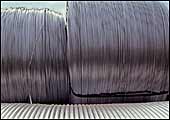|
The Bullion Angle: Idle Asset Or Great Investment
Option?
 Circa
2003, everyone, including this magazine, thought gold had reached
its peak. The yellow metal's price shot up to $372 an ounce (Rs
17,112 at the then exchange rate) and the universal opinion was
that it was unlikely to go any higher. Well, we were all wrong Circa
2003, everyone, including this magazine, thought gold had reached
its peak. The yellow metal's price shot up to $372 an ounce (Rs
17,112 at the then exchange rate) and the universal opinion was
that it was unlikely to go any higher. Well, we were all wrong
January 2004 was a great year for gold: prices rose from $343
an ounce on January 1 to $416.25 on January 31, reaching a 15-year
high. More importantly, the domestic price of gold on April 13,
2004 was Rs 6,040 for 10 grams, up from Rs 6,010 on January 31,
and just 4.88 per cent off the all-time high of Rs 6,335 registered
on January 12, 2004.
Gold's intrinsic value as an investment vehicle is considerable.
"It is a good hedge against currency fluctuations," says
Hiroo Mirchandani, Vice President (India), World Gold Council. That
makes it a must-have in any investment portfolio, a point of view
that most investment advisors are now coming around to. K.V.S. Manian,
the head of retail liabilities at Kotak Mahindra Bank, for instance,
advises his customers to build a diversified portfolio that includes
gold. "Gold generally has a negative correlation with other
asset classes, debt and equity."
However, given the age-old Indian approach of hoarding gold rather
than trade in it, there aren't too many gold-linked products around
(SBI and ICICI Bank are the only banks offering such products).
The market exists: "Last year, we sold 123,000 ICICI Bank Pure
Gold pieces," says Anup Bagchi, Joint General Manager (Retail
Liabilities Group), ICICI Bank. With other banks mulling the launch
of gold-denominated certificates, it may soon be possible to trade
in the yellow metal. You should.
-Ashish Gupta
 Should
you invest in commodities? Should
you invest in commodities?
Yes. And here's why: diversification
into commodities can help investors reduce their overall risk. Smart
investors have always been aware of this and made surrogate investments
in commodities. Direct investments in industrial commodities such
as steel and aluminum and agricultural ones such as rubber and pepper
requires a sales tax registration and a warehouse. However, commodities
futures now make direct investment in paper-commodities possible.
Investors can choose from three exchanges, the National Commodity
and Derivative Exchange, the Multi Commodity Exchange of India Ltd
and the National Multi Commodity Exchange of India Ltd, and start
with an investment as low as Rs 5,000. Several equity brokers have
diversified into commodities trading and the process itself is fairly
similar to equity trading (down to the extent of possessing a DEMAT
account). Even better, as long as trades are squared off, and there
is no delivery, investors do not have to pay sales tax . "If
you expect steel prices to go up, just buy steel (futures) instead
of steel companies," says Satish Menon, Chief Operating Officer,
Geojit Securities. Caveat: it takes some expertise to make money
from commodities. For instance, investors would do well to avoid
buying into bullion now. "At the moment the price is on the
high side and it makes sense to wait for the correction," says
Harmesh Arora, Vice President, Bombay Bullion Association. Like
gold, most commodities go through cycles and an understanding of
these could prove invaluable.
-Narendra Nathan
|
